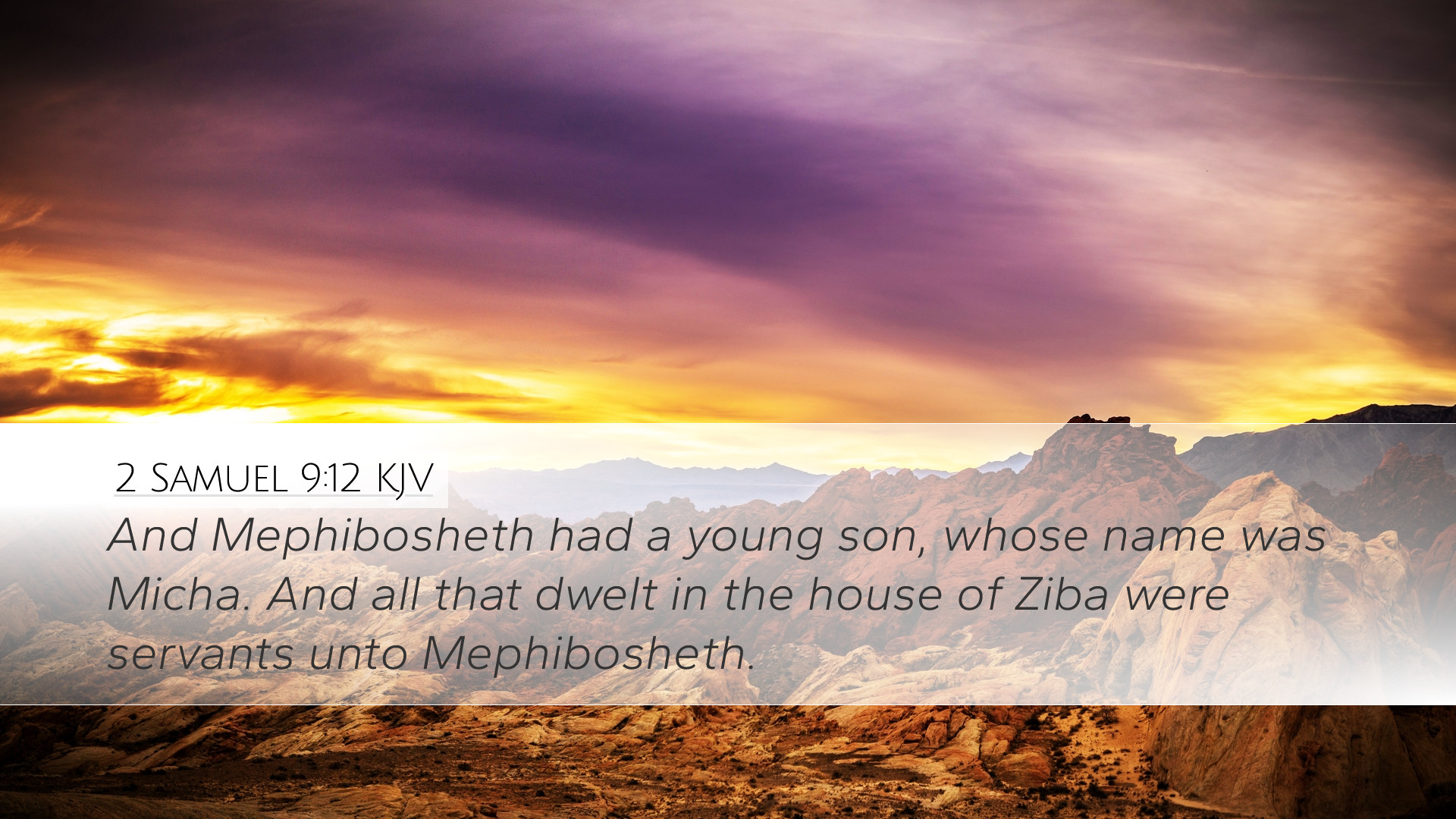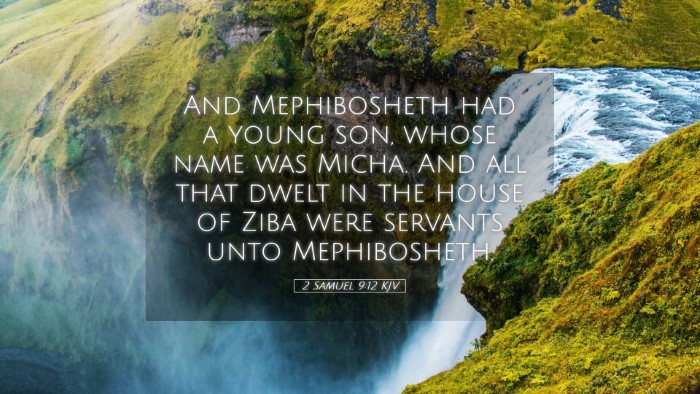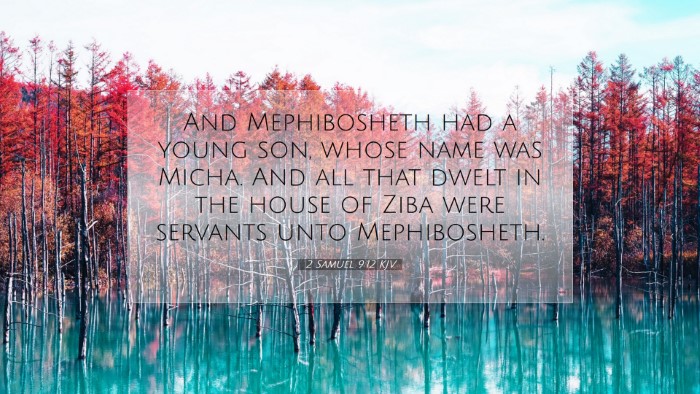Old Testament
Genesis Exodus Leviticus Numbers Deuteronomy Joshua Judges Ruth 1 Samuel 2 Samuel 1 Kings 2 Kings 1 Chronicles 2 Chronicles Ezra Nehemiah Esther Job Psalms Proverbs Ecclesiastes Song of Solomon Isaiah Jeremiah Lamentations Ezekiel Daniel Hosea Joel Amos Obadiah Jonah Micah Nahum Habakkuk Zephaniah Haggai Zechariah Malachi2 Samuel 9:12
2 Samuel 9:12 KJV
And Mephibosheth had a young son, whose name was Micha. And all that dwelt in the house of Ziba were servants unto Mephibosheth.
2 Samuel 9:12 Bible Commentary
Commentary on 2 Samuel 9:12
Verse: 2 Samuel 9:12
"And Mephibosheth had a young son, whose name was Micah: and all that dwelt in the house of Ziba were servants unto Mephibosheth."
Introduction
The context of 2 Samuel 9 revolves around King David's kindness to Mephibosheth, the son of Jonathan, and the grandson of Saul. This verse highlights the continuation of Mephibosheth's lineage and the gracious provisions made by David for Mephibosheth and his family. The characters involved in this narrative are significant not only for their historical roles but also for the theological implications concerning grace, mercy, and covenant-keeping.
Contextual Background
After David became king over Israel, he sought to honor the covenant made with Jonathan, Saul's son. David's inquiry about the surviving members of Saul's household leads him to Mephibosheth, who had been crippled in both feet. This verse follows the establishment of Mephibosheth as a beneficiary of David's grace, which is an exemplary representation of God’s kindness toward the undeserving.
Exegesis of 2 Samuel 9:12
This verse serves as a significant point in the narrative, referring to Mephibosheth's family line. The mention of Micah draws attention to the importance of lineage and inheritance in Hebrew culture.
- Mephibosheth's Son - Micah: The identity of Micah indicates a continuation of Mephibosheth's lineage, thus allowing Saul's family to carry on despite their tragic history.
- The Role of Ziba: The servants that dwelt in Ziba's house serve Mephibosheth, signifying the restoration of honor and estate that had been lost. Ziba's role transitions from a servant of Mephibosheth's father to a steward now responsible for his household.
Theological Implications
The narrative stresses profound theological truths regarding grace and covenant fidelity.
- Grace and Restoration: David’s actions towards Mephibosheth exemplify the grace of God, whereby a person who deserves judgment is instead shown kindness and given a place of honor.
- Covenantal Faithfulness: David's dealings with Mephibosheth display the importance of loyalty to one’s promises, reflecting God's unwavering commitment to His covenant people.
- Identity and Inclusion: Mephibosheth being named alongside his son signifies inclusion within the community, mirroring New Testament themes where Gentiles are engrafted into the family of God.
Insights from Public Domain Commentaries
Matthew Henry: In his commentary, Matthew Henry points to the unparalleled kindness of David, emphasizing that this act of kindness serves as a profound marker of God's covenant loyalty. Henry posits that Mephibosheth's status as “a dead dog” (2 Samuel 9:8) highlights the stark contrast between his lowly condition and the elevated position David grants him.
Albert Barnes: Barnes elaborates on the significance of the name Micah and its roots, suggesting that it contributes to the rich tapestry of the Israelite family tree. He underscores the importance of Ziba’s role as the steward and servant of Mephibosheth, which reflects the practice of servant leadership within the community.
Adam Clarke: In Clarke's analysis, the mention of the servants in David's court is noted to be a divine arrangement, as the entire household is established under David's authority. Clarke asserts that this speaks to the greater theme of God's providence and favor, even in the midst of devastating family histories.
Applications for Pastors and Scholars
The implications derived from 2 Samuel 9:12 are profound for contemporary ministry and theological reflection.
- Preaching Grace: Pastors can draw from this text to preach the radical nature of grace extended by God to sinners. It challenges our notions of worthiness and invites believers to understand their true identity in Christ.
- Fostering Community: In a world marked by division, this verse serves as a reminder of the importance of including marginalized individuals in our communities, producing environments reflective of God’s inclusive love.
- Covenant Theology: Scholars and theologians are prompted to explore the themes of covenant in both Old and New Testaments, identifying how God’s promises transcend cultural and historical boundaries, continuing to find fulfillment in the person of Christ.
Conclusion
2 Samuel 9:12 encapsulates the essence of God’s covenant faithfulness and the call to extend grace to others. Mephibosheth’s life, marked by hardship, transforms into a testimony of restoration and hope—teaching us the importance of mercy in our actions and the recognition of our interconnectedness within the body of Christ.


